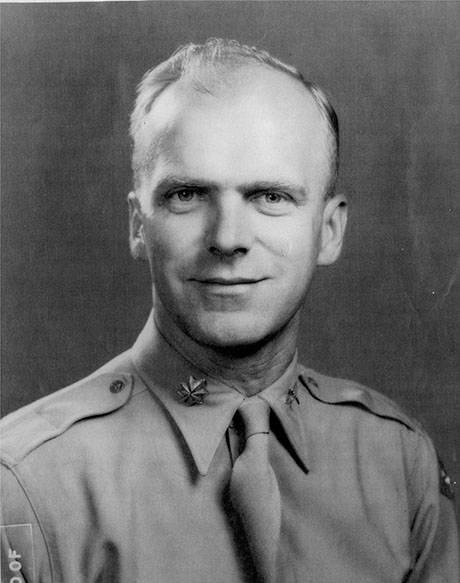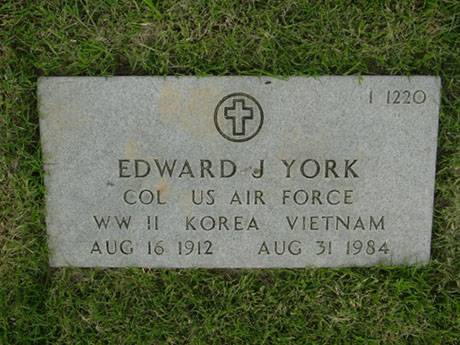
Pearl Harbor Day: December 7, 1941
A Date that will Live in Infamy
When this headline reached Genesee County, people worldwide, especially in the United States, were shocked! The Japanese bombed Pearl Harbor. Morale was down, and Americans needed something or someone to lift their spirits. That someone would be Jimmy Doolittle and our very own Edward J. (Cichowski) York. Jimmy Doolittle planned a raid on the capital of Japan. He trained for a B-25 Mitchell twin-engine light to take off from the Navy carrier, the USS Hornet. Eddie York was one of Doolittle's members of the raid on April 18, 1942. Col. James B. Sweeney, in 1984, 43 years after the 30 seconds over Tokyo, interviewed Colonel York. Here is what he said.
"I was a Squadron Commander at that time. We gathered in a room with General Doolittle, shook hands, shut the door, and he said, 'Gentlemen, we're going to bomb Tokyo.' We thought it was a joke at first. However, he outlined the plan very briefly. He told us, roughly, his plan, his thinking. We would have about 30 days to modify the aircraft, train, and prepare for the raid. I'd like to mention one thing that I've overlooked. That is the tremendous secrecy that had to surround this whole mission. Because if the word got out to the wrong people, it would be a failure, and it would be fatal to the folks that were going on it."
Doolittle's raid was the first attack against the Japanese homeland in World War II. The Batavia Daily News headlines read,
BATAVIA FLYER HELPED IN AIR RAID ON JAPS
Captain E.J. York Ranks with Nation's No. 1
Heroes after Daring Flight.
May 20, 1942.
The sixteen B-25 Mitchell bombers dropped high explosive bombs on oil refineries, steelworks, factories, and electrical power plants. The raiders could bomb their targets but were running low on fuel after thirteen hours in the air. Eleven of the pilots told their crew to abandon the planes. Most of the crews were able to parachute without injury. One raider was killed in a hard landing, one crew member was captured, and a pilot and engineer were later executed. Four planes crash-landed and two crewmen died in one of the crashes.
The following headlines from The Daily News state:
TOKYO RAID STORY SAYS BATAVIAN HELD BY REDS
Major E. J. York is the Only One of 16 pilots making a
Safe LANDING
BOMBED JAP BAY AREA.
Drastic Change in Plans Made
Dangerous Misson of 1942 More Dramatic
Here is what Colonel York recalls about the bombing.
"We'd been trained to pull the airplane up to 1500 feet before dropping bombs because the concussion was apt to cause damage to the airplane. At the proper time, I pulled the thing up to 1500 feet, dropped the bomb and I immediately pushed back down and forgot about staying there until the bombs went off. So we were rocked a little bit but no damage. By this time, I'd made up my mind not to go to China but to go to Siberia because of technical difficulties. I knew we were fighting on the same side in the war. 'According to international law, you must be interned.' I thought to myself, 'Oh damn, we're going to be here two or three days.' Well, the interment took place and we were still there 14 months later, at which time we got out. Eventually, we got back to the United States."
By 1945 York and his wife, Mary Elizabeth and their children resided in San Antonio, Texas. His military life did not end in Texas. The next headline on July 14, 1945, read;
LIEUTENANT COLONEL YORK NAMED AIR ATTACHE AT WARSAW, POLAND; FLYING TO NEW POST NEXT MONTH.
For the next 18 months, Edward and his family resided in Warsaw, Poland. His ability to speak Polish and Russian helped troubled Poland set up a provisional government of national unity in Warsaw. In addition, his work won the recognition of the United States, Great Britain, and Russia.
He returned to the U.S. in 1947 and was assigned as commandant of the Air Force Officer Candidate School. For the next 22 years, Colonel York had various assignments that took him to different countries and states. His military career spanned more than 30 years.
He served as air attaché to Denmark, serving as chief of the Air Force Section for the Military Assistance Advisory Group in Copenhagen, Denmark, chief of the Air Attaché Branch at Headquarters U.S. Air Force in the Pentagon, chief of staff for Headquarters Western Transport Air Force at Travis AFB, California, commander of an ICBM Site Activation Task Force at Larson AFB, Washington and chief of staff at Headquarters U.S. Air Force Security Service at Kelly AFB, Texas. He served as deputy commander at Headquarters U.S. Air Force Security Service from June 1966 until he retired from the Air Force on September 2, 1966. A military attaché is a military expert attached to a diplomatic mission (an attaché).
Edward J. Cichowski was born on August 16, 1912, in Batavia, NY. He was the son of Ignatius and Tekla Cichowski. In 1905 his father, a Polish immigrant, arrived in the United States. Edward grew up at 101 Harvester Ave. He graduated from Batavia High School at fifteen in June 1928. After high school, he joined the Army and later attended the United States Military Academy at West Point. He graduated in 1938 and immediately transferred to the Air Force and began flying at Randolph Field, TX. He was nicknamed York because he was from New York and it was probably easier to say than Cichowski.
On August 31, 1984, at the age of 72, retired Air Force Colonel York died in his home in San Antonio, Texas, of an apparent heart attack. He was buried at the Fort Sam Houston National Cemetery in San Antonio, Texas. He earned many decorations, including the Distinguished Flying Cross, Legion of Merit, the Chinese Army, Navy, and Air Corps Medal, and Class A, 1st Grade. His Distinguished Flying Cross Citation reads:
For extraordinary achievement while participating in a highly destructive raid on the Japanese mainland on April 18, 1942. Captain York volunteered for this mission, knowing that the chances of survival were extremely remote, and executed his part in it with great skill and daring. This achievement reflects high credit on Captain York and his military service.

